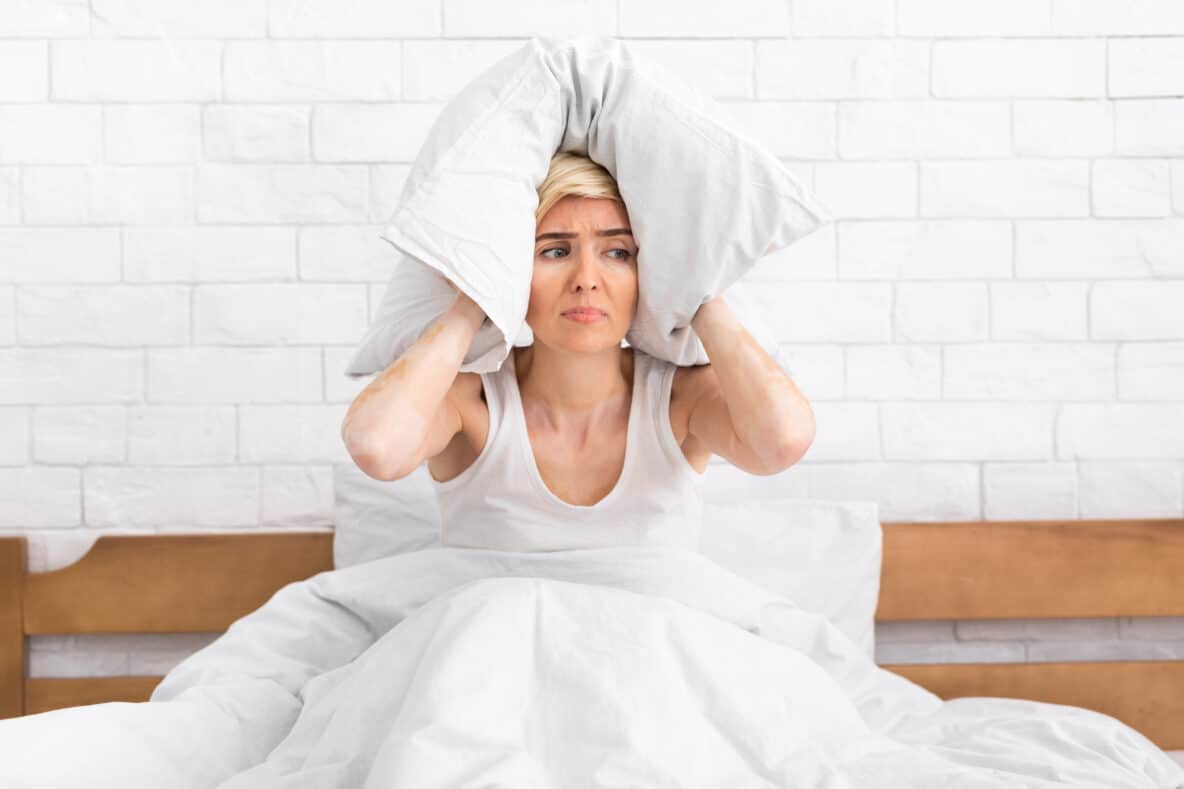What's the link between menopause and sleep? One of the most common complaints from women in our clinic is that they don't sleep well. Well, they're not alone.
According to this US study 56% of women over 40 are getting less than the seven hours of sleep per night that experts deem restful and healthy!
Not only does good sleep make us feel better generally, it's also vital for long term health.
But you knew that right? That's why it's so frustrating if you can't sleep! And that increased anxiety just makes everything worse.
The good news is that we can do something about it!
Watch the video or listen to the podcast (episode 121);
Why is sleep so important?
Obviously sleep makes us feel better each day. But there's so much more going on that just rest! The body is super busy at night doing all kinds of jobs including;
- Physical restoration
- Clearing toxins from the brain
- Information processing and memory
- Strengthening the Immune system
- Mood regulation
- Reducing risk of; obesity, heart disease, Diabetes, depression, cognitive decline and more
If you think about it, no other activity delivers so many benefits with so little effort!
Why are sleep and menopause linked?
Hormones
- Oestrogen/progesterone – these 2 hormones have a vital role in promoting good sleep. Oestrogen helps to produce serotonin which converts to melatonin (your sleep hormone), while progesterone helps to promote GABA a calming neurotransmitter. No surprise that hormone changes through menopause can result in sleep issues.
- Cortisol – your stress hormone will keep your mind on full alert, the opposite of what your body needs at night. Our stress resilience goes down and stress levels go up during menopause.
- Insulin – if your blood sugar is swinging from high to low all day, then a low in the middle of the night will wake you up (usually around 3am!). Menopause can make this worse!
- Serotonin – your ‘happy hormone' is also the building block of your ‘sleep' hormone. Oestrogen helps to make serotonin, so this can be affected when oestrogen declines.
Stress
Too much stress (of any kind) will increase cortisol and adrenalin production, altering your natural Circadian rhythm and nervous system. If your body is continually in ‘fight or flight' mode, it won't be relaxed enough to sleep properly. We know that midlife women report more stress than anyone else!
Diet
- Nutritional stressors – there are many dietary factors that can increase cortisol. If you're stressed or busy (hello midlife!), these can be hard habits to ditch. Watch out for;
- sugar & refined carbs
- bad fats
- processed foods
- food sensitivities – eg gluten, dairy
- alcohol
- caffeine (if you're sensitive)
- dehydration
- Nutrient Deficiencies – the body needs certain nutrients to function, including get you off to sleep. These include magnesium, tryptophan, B vitamins, Vitamin D etc. As we get older we may not be absorbing our nutrients as well as we used to.
- Blood sugar balance – too much sugar or refined carbs can cause surges and dips in your blood sugar, and this can affect your sleep. Menopause makes us more vulnerable to insulin resistance.
Sleep Environment & Routine
There's no doubt that your evening habits can hugely disrupt your sleep if not managed.
- Artificial light – light of any kind can interfere with the production of melatonin
- Gadgets – the blue light from your phone or tablet is like kryptonite for melatonin! Also if you're on them at night, your brain is stimulated, not relaxing
- Bed too late – ideally you want to benefit from the first cycle of sleep as that's the deepest and most restorative – so getting that 1.5 hr cycle in before midnight can be hugely helpful (ideally sleep by 10.30pm!)
- No wind down – if you're not giving your body time to relax before bed it's more likely going to keep you awake
- Eating too late – if your body is busy digesting food, it's not going to be relaxing you
- Alcohol/caffeine – both need to be managed if you're not sleeping well.
Natural Ways to Sleep Better
- Stress Management – a non-negotiable if you're not sleeping well is to manage your stress. Remind yourself to take your 15-20 minutes of me-time every day to switch off that cortisol response.
- Balanced Hormones – try to balance your hormones;
- Insulin – eat protein, healthy fats and complex carbs (fruit & veg mainly) at each meal to balance your blood sugar
- Oestrogen / progesterone – balancing these 2 is a priority for sleep. If your oestrogen is high, try cruciferous veggies, fibre and liver support to flush out excess oestrogen. If both are low, consider body identical HRT or phytoestrogens in your diet or supplements.
- Serotonin and Melatonin – get outside every morning to get daylight to stimulate serotonin. Limit artificial light at night to allow melatonin production.
- Good nutrition – eat a nutrient rich diet and take good quality supplements. In addition to my Top 5 basic supplements, try Feel Sleep formula and/or a good CBD oil, which are my go to's for sleep issues.
- Good sleep rules – make sure you have a good sleep routine before bed. Don't stay up or eat too late, make your room dark and cool, ban gadgets, avoid news/thrillers, limit caffeine/alcohol and try a relaxing meditation or breath work before bed.
Sleep and menopause can be a tricky combination, but if you follow these steps I hope your sleep will improve.
And if you'd like to dig deeper and find out more about how testing can help identify what's causing your sleep issues, message me your email address and we'll send you some information!

